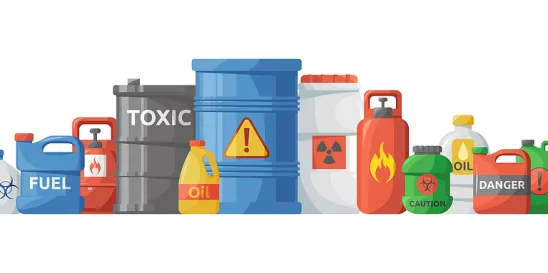Passed by a referendum by California voters, the Safe Drinking Water and Toxic Enforcement Act of 1986—better known as "Proposition 65" or "Prop. 65"—requires the governor of California to publish a list of chemicals "known to the State to cause cancer or reproductive toxicity." At present, more than 700 chemicals are listed as carcinogens or reproductive toxicants. (The full list of chemicals is available at www.oehha.ca.gov/prop65/prop65_list/Newlist.html.)
The law establishes two prohibitions regarding use of the listed chemicals:
- No person may knowingly discharge or release a listed chemical into water or into or onto land where it will pass into a source of drinking water.
- No person may knowingly expose any individual to a significant amount of a listed chemical without first providing a "clear and reasonable warning" to such individual.
It is typically this second requirement that gives product manufacturers fits. The proponents of Prop. 65 expected that the required warning would be perceived by industry as a deterrent to sales thereby encouraging product reformulations. Consumers usually have a negative reaction when they see a warning on products they and their children use, including food, over-the-counter drugs, or personal care products-especially one that warns against cancer or reproductive toxicity.
The law requires these warnings to be provided for consumer product, workplace, and environmental exposure unless "the person responsible can show that the exposure [to a listed carcinogen] poses no significant risk assuming lifetime exposure at the level in question," or, for a listed reproductive toxin, "will have no observable effect assuming exposure at 1,000 times the level in question."
The statute also makes it the responsibility of the product manufacturer (or for workplace exposures, the employer) to determine whether its products or activities can reasonably be expected to result in a significant exposure.
Warning requirements go into effect for a given chemical one year after the chemical is officially listed. The discharge prohibition takes effect 20 months after a chemical is listed.
Violations of Prop. 65 are subject to hefty civil penalties of up to $2,500 per day for each violation. Injunctive relief is also available. Prop. 65 may be enforced by the California Attorney General, local district and city attorneys or, "bounty hunters"-private citizens permitted to bring enforcement actions if the state declines to do so or does not act within 60 days after it is notified of an alleged violation.
Because success in such a suit entitles the bounty hunter to 25 percent of any penalties assessed by the courts, Prop. 65 enforcement actions have become a lucrative business for many bounty hunters. The unfortunate and unintended consequence of the scheme has been a rash of abusive filings by those seeking a quick buck, rather than meaningful enforcement of the law.
Accordingly, the law was amended early in 2002 to require a "certificate of merit" showing that a private party threatening enforcement action has determined that there is a reasonable and meritorious basis for the private action. This determination is based upon consultation with an appropriate expert who has reviewed the facts, studies, or other data relevant to the exposure that is the subject of the action. Other reforms were also put in place.
Federal Preemption: No Obvious Answers
Federal preemption is another issue around which Proposition 65 has generated significant controversy. In general, where state requirements conflict with federal law, or result in inconsistent requirements between states, not all of which can be obeyed, federal law preempts or overrules such conflicting or inconsistent regulations mandated by the states. Thus, it would seem obvious that when a federal law mandates product warning requirements, it should trump the conflicting warning requirements of a state. In this way, workers and consumers can be appropriately protected and given the information they need to make reasonable decisions, while businesses selling products in interstate commerce are not unnecessarily burdened with having to satisfy differing label requirements for individual states.
Unfortunately, when it comes to Prop. 65, this isn't ordinarily the case. Both a federal appeals court and a California appellate court found that Prop. 65 warning requirements are not preempted by either the Federal Insecticide, Fungicide, and Rodenticide Act (FIFRA), which regulates pesticides, or the Federal Hazardous Substances Act (FHSA), which regulates other consumer products. Both of these statutes have specific warning requirements that manufacturers must meet and specific provisions preempting inconsistent or conflicting state and local requirements for such products.
The issue of warning labels on nicotine-containing smoking cessation products illustrates the difficulties raised by the Prop. 65 scheme.
According to notices filed by a bounty hunter informing of its intent to bring a Prop. 65 enforcement action, nicotine delivery systems do not provide adequate warnings to pregnant women regarding potential birth defects or reproductive harm these products can cause. While the state was pondering its course of action, it received advice from several public health groups, which took the position that such an action could undermine public health by requiring labeling that could discourage the use of the products. The organizations further added that the FDA considered the risks and benefits of such products and already mandated a warning label that appropriately informs users of those risks.
The FDA weighed in as well, telling the state that the federal warning requirements "clearly and accurately" identified the risks, and expressed its opinion that the warning "meets the standards applied by your office for determining that a warning is 'clear and reasonable' under Proposition 65." What's more, the agency continued, the standard safe harbor warning used under Prop. 65 "could be considered inaccurate and possibly render the product misbranded" under the Federal Food, Drug and Cosmetic Act. However, FDA originally stopped short of actually saying that it would consider the Proposition 65 warning requirement preempted in this instance, suggesting instead that the issue was moot since the federal labeling requirement fulfills the state's "clear and reasonable warning" requirement.
While FDA sidestepped the preemption issue, the state Attorney General took it on headfirst, informing the bounty hunter that, with regard to smoking-cessation products, FDA requirements specifically preempt Prop. 65. The AG's preemption analysis included an interpretation of the national uniformity provisions in the FDA Modernization Act of 1997 (FDAMA), which contains a provision expressly preempting state laws regulating non-prescription drugs.
Although a qualifying provision in FDAMA provides a specific exception for state laws adopted by initiative prior to Sept. 1, 1997-i.e., Prop. 65-the AG asserted that the provision must be interpreted as prospective in nature only, and thus would not apply to label determinations made by FDA prior to passage of the act. Because the nicotine delivery system warning was designed by FDA in 1996, it is not considered covered by the exception to the rule, he argued.
While the AG may have been seeking preemption only in the case of smoking cessation products, the logic of his decision would apply to any other drug products that carry pre-FDAMA FDA-mandated labeling. And there's the rub.
That Was Then; This Is Now
Although cautioned to back off by both the state and FDA, the bounty hunter nonetheless proceeded to file suit against several nicotine patch companies. After suit was filed (and a new administration came into office in California), the state AG's office reversed its position, now arguing that federal labeling requirements for this product did not preempt Prop. 65. Simultaneously, FDA issued additional missives reiterating its position that the simplicity of a Prop. 65 warning ignores FDA's risk/benefits analysis for medication labeling, and that deference should properly be given to these determinations. It also stressed the potential misbranding quandary in which a manufacturer could find itself if it attempted to use a Prop. 65 warning.
The trial court agreed with FDA and the defendants, and dismissed the case. The matter is now on appeal, and the federal government has filed a "friend of the court" brief, again urging preemption.
Legislative Response Needed
The U.S. Congress has considered, at various times since its enactment, legislation that would partially or wholly preempt Prop. 65, as well as similar statutory schemes currently being considered by other state legislatures.
Until such time as Congress is successful in passing legislation in response to Prop. 65, suppliers of materials used in products, including manufacturers of packaging materials, will continue to be questioned by their customers concerning the presence of listed chemicals in their products-and by money-seeking bounty hunters, whose questions will be presented in the form of a legal action, rather than a questionnaire.




 />i
/>i

